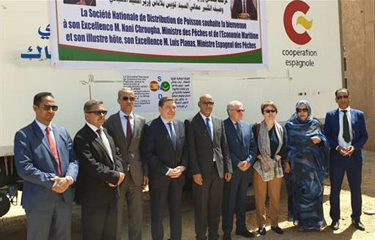Mauritanian firm seeks Chinese investment despite Hong Dong investigation

Even as a Mauritanian parliament committee investigates a controversial 2010 deal with a Chinese company, a fishing firm from the West African nation is seeking investors for a new venture focusing on pelagic species.
Mauritania’s parliament has organized a committee to investigate deals signed by former President Mohammed Ould Abdel Aziz, including a 2010 agreement with a Chinese firm for access to Mauritanian waters. The firm, Fuzhou Hong Dong Yuan Yang Fishing Co. (also known as Poly Hong Dong), has built what it claims is China’s largest overseas fishery base in Mauritania. The company ships seafood from the base to European Union and U.S. customers, while also producing fishmeal.
The investigation hasn’t deterred Pêche Commerce Armement PCA Sarl from pursuing Chinese investment for a new project aimed at exporting pelagic species including mackerel and sardines. Previously, the company has focused on octopus for the Japanese market, but it now wants to find an international partner to tap the Chinese market. according to technical director Mohamed Abdallah Cherif.
“Bottom-fishing species like squid, sole, cuttlefish, sea bream, and grouper is fairly saturated and therefore not very interesting,” Cherif told SeafoodSource. “By contrast, the pelagic is more abundant and capable of assuring a development in the processing of fish and for production of fishmeal and fish oil. The species we’re talking about are sardines, anchovies, mackerel, and horse mackerel.”
The sustainability of Mauritania’s fishery stocks has increased as the country saw the value of its seafood exports drop last year to USD 638 million (EUR 587 million) from USD 706 million (EUR 649 million) in 2018, with volumes down from 287,500 metric tons (MT) to 248,000 MT.
“The stock levels of Mauritanian fish remain, just that the capture levels vary from year to year depending on the fishing effort,” Cherif said. “We are seeking a partner or investor for the provision of financing and also to [help us] penetrate the Chinese market as well as other markets like Africa and Europe. We welcome northern European and Chinese partners.”
Fifty Spanish vessels operate in Mauritanian waters under a deal negotiated by the E.U., which is up for renewal this year. Spanish Fisheries Minister Luis Planas said he hoped a new deal could be inked soon when he visited his counterpart, Nani Ould Chrouga, last month. An E.U. deal for access to Mauritanian waters is worth over EUR 65 million (USD 70 million) a year to Mauritania.
China’s Exim Bank has extended a loan of USD 87 million (EUR 80 million) to the Mauritanian government for the construction of a fishery port, which is expected to create 2,300 jobs. Meanwhile the E.U. has allocated EUR 368.9 million (USD 400.7 million) in development aid to Mauritania for the period 2014-2020, with a focus on food security. The country is part of the Sahel G5 – five countries central to E.U. policy for limiting Islamic fundamentalism and migration into Europe.
Photo courtesy of Spanish Ministry for Agriculture, Fisheries, and Food






Share